- Home
- Scott Kenemore
Zombie-in-Chief Page 2
Zombie-in-Chief Read online
Page 2
“Tim, what’re you doing here?” she asked.
“The same thing you are, I expect,” he said with a smile.
“It’s been so long since I’ve seen you!” she said. “You were always so much fun to have in class—so lively and full of interesting ideas—and we all missed you so much after you left the program. Are you doing okay?”
“Oh, this?” he said, gesturing to the brace that framed his head like a sixteenth-century ruff. “Old injury. Acts up every now and then. The doctor said I should wear this whenever it hurts.”
“Oh,” said Jessica. “But I meant, how have you been since … since I last saw you in New York?”
Tim had been a member of Jessica’s class at the Columbia University Graduate School of Journalism, but had dropped out before the end of their first year. It was not entirely unheard-of for students to leave the program. Sometimes they discovered they simply didn’t like journalism, winced at the dim career prospects, or just didn’t get along with the professors. In Tim’s case, it had been the latter. Sort of. Outside of his studies, Tim had been operating a mean-spirited political gossip blog in his free time. A professor had learned of this, taken Tim aside, and strongly encouraged him to discontinue the project if he expected ever to be employed by a respectable news organization. Tim had found this a rather shortsighted view of the situation, and had separated from the program not long thereafter.
“I’ve been fine,” Tim said with a glint in his eye. “More than fine, if you really want to know! I’m doing quite well. I heard about your job, though. Wow! That’s the real brass ring. Congratulations.”
“Thanks,” said Jessica. “So, who are you here with? Are you still doing your … your …”
Tim smiled to say that she could relax. He had heard it all before.
“My trashy political website?” he finished her sentence. “Yes and no. It kind of got folded into something else.”
Jessica raised her eyebrows inquisitively and hopefully. Perhaps things had not gone so poorly for Tim.
“I’m now part of TruthTeller,” he said. “I have my own regular column about politics, plus I get to do in-the-field reporting. It’s a really nice arrangement.”
Jessica’s eyebrows strained under the weight of this new information, and eventually buckled. Her whole face fell.
“TruthTeller?” she said, her voice falling to a whisper. “But that’s that … fake news website, right?”
“Well people call us that,” Tim said, nodding. “But for every door it closes, it opens ten others. TruthTeller is a place where we can ask the questions that others won’t ask. Can’t ask. We pick up and look underneath the rocks that others won’t even touch. Sometimes we don’t find anything … but sometimes we do. It’s freeing. Very exciting, too. I feel like we’re on the leading edge of some revolutionary things.”
“And it’s run by that angry shouting man, yes?” Jessica said. “The chubby one who’s always selling nutrition supplements?”
Tim nodded sheepishly.
“Well … as my colleague was just saying to me … a paycheck’s a paycheck, right? That’s why we do this. They do pay you, yes?”
“Yes,” Tim said. “And that’s good, because Columbia didn’t forgive the loans I took out … even though I didn’t finish.”
“Oh,” Jessica said. “Right. I didn’t even think of that.”
Jessica’s father was a stockbroker who had retired at 50; her mother, an orthodontist to the stars (or at least their children). Jessica’s tuition at Columbia had been taken care of by her parents, who had also seen fit to house her in a doorman building in Morningside Heights for the duration of her studies.
Jessica suddenly thought of George and glanced back down the patriotically-decorated hallway.
“Gosh, I ought to get back with my boss, but we really should catch up some more,” she told Tim. “It’s so nice to see you again. And so surprising! Maybe we could get dinner or a drink sometime this week.”
“Yes,” Tim said hopefully. “That’d be great. Here …”
He began fishing about inside the front pocket of his jeans. Moments later, his greasy fingers had located a business card, only slightly stained with mustard. It looked homemade—printed on a personal printer and cut, inexpertly, with a pair of kitchen scissors. Tim pushed it into Jessica’s palm.
She gripped it awkwardly and brought it up to her eyes.
Tim Fife
Senior Political Content Creator
TruthTeller—“Where the Truth Will Find You”
His email and phone were listed beneath that.
“Thanks,” Jessica said, thrusting it into her pocket. “Great running into you, Tim! Being here is all so strange. It feels surreal. I have no doubt this is gonna be a crazy week!”
Tim’s face grew eerily still. His heavy breathing fell to a Darth Vaderian murmur. The mustard on the side of his face caught the light from the fluorescent fixture above, and seemed to glisten with supernatural power.
“You have no idea how crazy,” he whispered ominously. “You have no idea.”
THE FAKE NEWSMAN
As Jessica Smith departed, Tim Fife straightened his neck brace and returned his ample body to his chair. Only as he sat back down did he notice that the medical device—and indeed, much of the front of him—bore a thin but prominent stripe of yellow. He resolved to clean it off at his first convenience, but not immediately. For the moment, there were more pressing matters at hand. Tim opened his laptop and began to type.
They were living in times of wonder and astonishment. Every sign pointed to this conclusion. Every star that shone seemed to consecrate this idea with its slow arc across the sky. These days had never come before, and they would never come again. This was all unique.
Tim’s responsibility was to help his readers understand this simple but vital fact. This election was not like others, because in this election the whole story was not being told.
There might have been wars waged on the public’s access to information at other junctures in history, but never to such a degree, never in such an organized way, and never with so many involved in the conspiracy. In previous generations, it might have happened accidentally. But now there was now a horrible intentionality to it. The truth—not just about one thing, but about many—was being intentionally held from the people. The digitization of information had made this withholding possible. Collusion no longer needed to occur at secret midnight gatherings. It could all be executed and coordinated remotely, and ’round the clock.
That was why the resistance needed to use these same tools. It needed to be digital, nimble, and unafraid.
As the smell of her perfume began to disappear from the conference room, Tim felt genuinely sorry for his J-school colleague Jessica. The world was changing and moving on. Institutions like hers had failed to notice. Sure, he could momentarily envy her salary and prestige, but how long could it last? Jessica had signed on with one of the finest and most respected producers of buggy whips … but the era of the automobile was dawning. You could smell the gasoline on the wind. It was coming. Tim Fife was sure of it.
Seeing Jessica had been a distraction—a welcome one, but still a distraction. Tim tried to refocus. He forced himself to return to the task at hand. Now was not the time to be sidetracked. Not by old friends, or even by old friends who were attractive young women. His work was so important. At times, Tim could be overwhelmed by the sheer magnitude of the responsibility that fate or God or the universe had placed upon his neck brace. The future of the world was at stake. Literally the world. For the next four years, at least.
Before Tim could ruminate further on the importance of his charge, he was interrupted by the arrival of the rest of the TruthTeller convention team. They were a pair of men who—aside from a deep and abiding dedication to fact-finding at any cost—could not have been more opposite.
Ryan Hoffwell was loud and large. He wore his hair even longer than Tim did. His t-shirt was even more
filthy. And he outweighed the already-portly Tim by a good hundred pounds. When Tim stood next to Ryan, he felt thin and handsome.
Dan Kieffner was the other TruthTeller representative. Dan was in his early forties and did not like to talk about his past. He was tall and bald. He had a leer that bespoke a capacity for violence. He did not dress “well” by any precise understanding of the term, but could usually manage to find clothes that were appropriate to the situation (which was more than could be said of Tim or Ryan). Dan had muddy tattoos that ran along his arms, the kind that were usually administered for free by a roommate during a stay as a guest of the government. And “the government” turned out to be the two words you did not want to mention around Dan. Worse than any slur or slander, reminding Dan that—across the world, in every nation, in every place you went—people tended to be governed … made him halfway insane. For this reason, Tim Fife had been surprised when TruthTeller management had designated Dan as a member of the team that would be covering this convention. (Usually Dan wrote about instances of government overreach: Police shutting down a kids’ lemonade stand for lack of permits. A township that required licenses for professional dog walkers. Mandated government certifications to paint someone’s fingernails. That sort of thing.) Since arriving in Cleveland, Dan had seemed even quieter and more disturbed than usual. Privately, Tim wondered if Dan had been sent along by management in the hopes that—if he could not report on it—Dan would perhaps make the news. By going crazy. (Everyone expected something to happen at the convention. Maybe that “something” was going to involve Dan Kieffner.)
The trio settled back into their chairs. As was typical, it was Ryan who spoke first.
“I brought doughnuts,” he said. “They had doughnuts in a room over there. A sign said they were for reporters, so I totally took some.”
Tim looked up expecting to see a plate of doughnuts, and found that Ryan had snagged an entire box. Well, Tim thought to himself, at least it was only one box.
“Who was that lady?” Dan asked, opening his laptop.
“Just an old friend from J-school,” Tim said. “She’s here for work too.”
“She’s down the hall in one of the nice conference rooms?” Ryan observed. “Sounds like a member of the establishment to me.”
“Eh, she’s not so bad if you get to know her,” Tim said. “One of the good ones.”
“You were in a co-ed … J-school?” Dan asked suspiciously. “The ‘J-school’ I went to, we were segregated into cell blocks and never got to see women.”
“Journalism school,” Tim said. “Not—”
“Oh,” Dan said. “Never mind then …”
The trio ate doughnuts and checked their emails. TruthTeller headquarters would often send suggestions for stories to file, but the reporters also received their share of news tips directly from readers and private sources. It was these informal tips (and the green light to follow up on them, if one so wished) that made working at TruthTeller so different from other reporting jobs, and—at least in Tim’s opinion—so much fun. When you wrote for the New York Times or the Chicago Tribune, there were topics upon which you’d automatically take a pass. New photographic evidence that members of the British royal family were actually lizard people, for example, did not tend to be pursued by those outlets. Conspiracy theories at all generally seemed to be quite scarce between their pages. TruthTeller, which did not have pages—at least not the kind you could stick things between—was different. Some conspiracies, it suggested, might very well be true. Others, which were such whoppers that even regular readers of TruthTeller found them hard to swallow, still received attention via reporting on the phenomenon of the conspiracy. “We’re not saying that there’s good evidence that the Federal Reserve is controlled by shape-shifting aliens, but a lot of people seem to think there is. How could this be? What’s really going on? And how could the mainstream media—the MSM, for short—have failed so utterly to tell you about this phenomenon?”
It was upon this final question where TruthTeller really hit its stride. TruthTeller positioned itself as a trusted friend who you could count on to shoot straight and treat you like an adult. MSM news outlets felt they were performing a service by “protecting you” from news that was too wild or outrageous. But had you asked to be treated like a child? To be fed the pablum of censored, safe, gentle news?
Or were you an adult who deserved to hear the whole story?
Tim and his TruthTeller colleagues endeavored to make readers feel as though they were.
And so Tim scanned his inbox, looking for the next lead full of danger, intrigue, and suggestion. Many tips contained interesting speculation, but no new information. Even more frequently, the tips would involve topics that TruthTeller had already done to death. Sometimes, what Tim saw disturbed or confused him. Sometimes it bored him. Many tips quite simply made no sense at all.
In recent days, one of the recurring messages he’d been instantly dragging to his “Delete” folder had concerned information that one of the major party nominees in the next presidential election was a member of the walking dead. These tips appeared to come from multiple sources, but that meant little to nothing. Many tipsters with agendas often sent in the same information using multiple identities and email addresses. Tim had taken to ignoring the emails with the screaming subject lines like: “DEFINITIVE PROOF: Candidate is a Zombie!—TruthTeller must publish!!!” It was too fantastic, even for him.
Thus, is was not Tim, but Ryan, who brought it up.
“Are you guys seeing the zombie thing?” he asked between bites of second doughnut.
Tim and Dan grunted yes.
“I’m starting to think there could be enough for a story,” Ryan said. “I dunno. Maybe a few hundred words?”
Tim stopped clicking and leaned back in his chair.
“Really?” he asked Ryan. “We’re not exactly starved for content right now. We’re at the convention. Anything could happen. Everybody is here. You really want to spend your time on a supernatural angle?”
“Yeah, but … do you ever just get a feeling?” Ryan asked.
Ryan was going right for the big guns.
Of course Tim got feelings about stories like this. Of course he did. It was one of the reasons why he worked at TruthTeller, despite the lousy pay and the lack of professional respect. Tim understood on a deep, primordial level that you could sometimes get a special feeling that something needed to be reported on. And when that happened, you needed to be free to do it.
“Sure,” Tim said, adjusting his neck brace. “I know all about getting feelings.”
“Well, I’m getting the feeling that this could be usable,” Ryan said. “Zombies are a new angle. They bring so many things to the table. Religion, mysticism, violence. I dunno. The more I think about it, the more I like it.”
“I’ve seen those same emails, but I haven’t read many,” Tim admitted.
Tim toggled into his garbage file to see if some might still be there.
“It’s just … I dunno,” Ryan said. “I think there’s space to make some interesting connections to the candidate. There’s his charity work in Haiti. The trips with a billionaire donor to a vacation home on what the locals call ‘Zombie Island.’ And of course the rumors about what goes on at his club in Florida. That’s not a few hundred words?”
Tim shrugged. Perhaps Ryan had a point. While there would be angles aplenty to pursue on convention week, perhaps a conjectural piece about the undead would be the right thing to get their gears turning.
“Do you want to take it?” Tim asked.
“I mean, you can if you want to,” said Ryan.
“Really?” said Tim. “You were the one who had the feeling.”
“I didn’t necessarily mean it was the right story for me,” Ryan said.
“Yeah, okay,” said Tim. “Then maybe I will.”
Tim slowly pulled together the related emails. The messages had been addressed to him, but had obviously gone to the enti
re TruthTeller staff. The spray-and-pray method. Hey, when you had a scoop like this, you wanted to leave nothing to chance.
Tim looked over the grisly inventory the tipster had sent. It included a bulleted list of all the reasons why the major party candidate was actually a zombie, and promises of “ironclad” photographic evidence to be shared at a later date and in person.
Tim shook his head, smiled, and hit reply.
THE TYCOON
Ohio was more than just a “swing state.” That was what his advisors had told him. Instead, they said, Ohio was like a small version of the entire country. Like a little America, miniaturized and dropped in the middle of the cornfields. It was half urban and half rural. Half conservative and half liberal. It had college towns; gleaming, growing cities; rusting, dying wastelands; and acres and acres of farmers and Amish and 4-H. Parts of it were flat, but parts out east were practically West Virginia hill country. Parts were black, and parts were whiter that white, and there were enclaves of other ethnicities too. All manner of religious devotions were observed, from the casual to the all-consuming and cultish. The Tycoon’s advisors had told him these things, he guessed, to make him feel as though the place was at least 50% on his side. It was half of everything, they reasoned, so it must be half with him.
He wished, now, they’d merely left it there, with that single idea. But no. Unable to contain themselves, they had provided embellishments. Painted vivid verbal pictures of all the great variety that the state offered. Really fleshed it out.
And now the Tycoon understood that there was nothing here to which he might truly relate. The duality of the place did not suit him at all. For a man raised amongst the skyscrapers of New York, the idea that the cultivators of these immaculately square patches of farmland—which he could see so vividly from the window of his airplane—were the ones on his side? Were his 50%? The notion seemed insane. Impossible.
It was in these moments that the overwhelming depression took him, and the Tycoon wondered if the talking heads on the Sunday morning political shows might know something after all. That he would never impress these voters, or, at least, never excite them to the degree needed to win the day. That he could not relate to their tractor pulls and their church bake sales and their weekend hunting trips. (The Tycoon had stepped aboard a tractor only once in his life—to prove it was safe—after a farming operation owned by his father had suffered a spate of OSHA violations. Religious institutions were also not well-known to the Tycoon, for he experienced a slight but steady burning sensation whenever he set foot inside one. Weekend hunting trips, however, might be the place where a little common ground could be found…. Something about hunting hunters had always been deeply satisfying to him. There was an irony involved.)

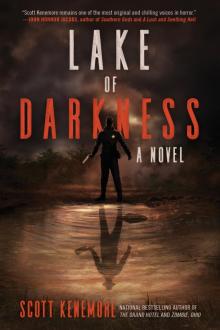 Lake of Darkness
Lake of Darkness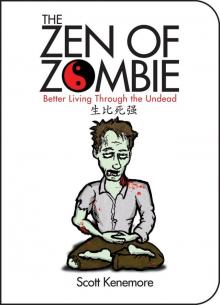 The Zen of Zombie
The Zen of Zombie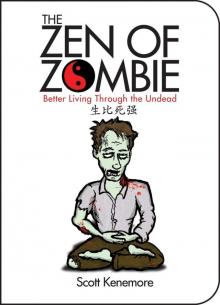 Zen Of Zombie (Zen of Zombie Series)
Zen Of Zombie (Zen of Zombie Series)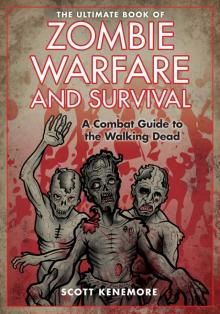 The Ultimate Book of Zombie Warfare and Survival
The Ultimate Book of Zombie Warfare and Survival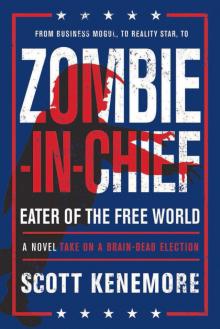 Zombie-in-Chief
Zombie-in-Chief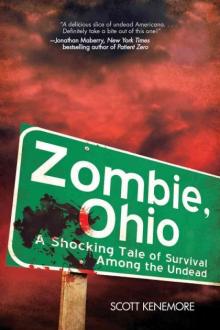 Zombie, Ohio
Zombie, Ohio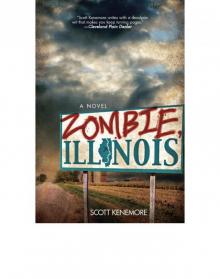 Zombie, Illinois
Zombie, Illinois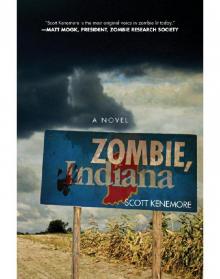 Zombie, Indiana
Zombie, Indiana